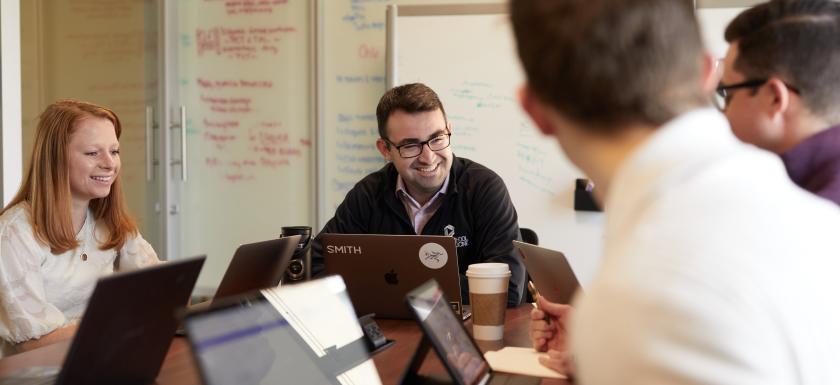Charting the course
The Research Scholars Pathway is a 4-year elective program to recognize SIU medical students for their research efforts completed while in school. Qualified students will be recognized as SIU School of Medicine Research Scholars in both their residency applications (via ERAS) and the MSPE (Dean's letter).
For two years, medical students Matt Mannion, Nic Revelt, Taylor Badger, Sam Mounce, Emma Johns, Bridget McClain and Hannah Roberts collaborated with faculty both at SIU and at outside institutions to find a model that works best for the curriculum.
Watch the video to learn more about SIU School of Medicine's Research Scholar Pathway.
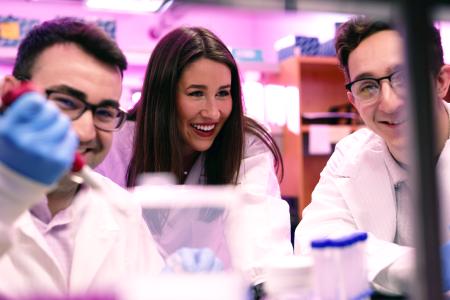
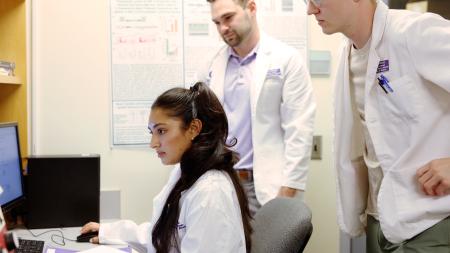
A core mission
SIU School of Medicine has long been committed to research that not only serves the community of central and southern Illinois, but also impacts patients around the world. Over the last 50 plus years, SIU School of Medicine has produced numerous physician scientists that have impacted health care and health education through basic, translational and clinical research.
The purpose of the Research Scholars Pathway is to acknowledge the efforts of medical students who pursue research opportunities and make contributions to our institutional research. The pathway will also provide consistent training in the ethical, legal and regulatory aspects of performing research, and create a venue to increase accessibility to research experiences for medical students.
Requirements
A group of faculty associated with the Research Interest Group (RIG) will administer the curriculum on the Springfield campus. In Carbondale, Dr. Diana Sarko will guide the program, with input from faculty directors of the Mentored Professional Enrichment Experience (MPEE) and Clinical and Research Experience (CARE).
* Good academic standing is defined as no Student Progress Committee (SPC) activity, which means that the student has not, at any time received a: letter of concern, letter of warning or academic probation from the (SPC).
Students interested in pursuing research can begin to formulate a plan and identify their mentors.
- Students should join the Research Interest Group during year 1
- Research Scholars students must participate in hypothesis-based research during the summer between M1 and M2. The Clinical and Research Experience Program (CARE),Mentored Professional Enrichment Experience Program (MPEE), or approved individually-designed summer research projects are all appropriate avenues to complete this requirement.
- Students must work with basic science faculty or clinical faculty to develop a project.
- Attendance of 60% of Y1 journal clubs (2 out of the 3) is sufficient for fulfilling the attendance requirements. Attending research interest group or Med Ed interest group meetings are recommended but not required for attendance purposes
- Only those students in good academic standing are eligible to participate
- MPEE students MUST present their M1 summer research at the SIU School of Medicine Research symposium during Year-2.
Important dates:
MPEE application deadline: February 6
CARE program application deadline: April 1
- Students must participate in hypothesis-based basic, translational, or clinical research. Find a research mentor/ RSP mentor. Use research database to identify research mentors
- Students must participate in the Research Interest Group. Should maintain 60% attendance in research interest groups or Med Ed interest group meetings (6 out of 10 meetings)
- Students should keep a log of the research hours approved by their research mentor(s)
- By the end of Y2, students MUST present at least one abstract to a conference (oral or poster presentation). Students are highly encouraged to co-author a journal article submission. Students MUST present an abstract at the Annual SOM Trainee Research Symposia (this satisfies the presentation requirement).
- Only those students in good academic standing are eligible to continue in the program
Important dates:
Complete Laserfiche form to apply for RSP: By October 31.
Complete Student checklist each year in Laserfiche Forms: By July 1.
- Students must participate in the Research Interest Group. Should maintain 60% attendance in research interest groups or Med Ed interest group meetings (6 out of 10 meetings)
- Students should keep a log of the research hours approved by their research mentor(s)
- By the end of Y3, students MUST present at least one abstract to a conference (oral or poster presentation). Students are highly encouraged to co-author a journal article submission. Students MUST present an abstract at the Annual SOM Trainee Research Symposia (this satisfies the presentation requirement).
- Only those students in good academic standing are eligible to continue in the program
Important dates:
Complete Student checklist each year in Laserfiche Forms: By July 1
- Students must participate in the Research Interest Group. Should maintain 60% attendance in research interest groups or Med Ed interest group meetings (3 out of 4 meetings)
- Students should keep a log of the research hours approved by their research mentor(s)
By the end of Y4, students MUST present at least one abstract to a conference (oral or poster presentation). Students are highly encouraged to co-author a journal article submission. Students MUST present an abstract at the Annual SOM Trainee Research Symposia (this satisfies the presentation requirement). - Presentation at external scientific meeting(s) and publication in appropriate journals should be the overall goal
- Should complete 6 weeks of research electives (Structured available electives or Individually Designed Electives-IDE, with prior approval).
- Only those students in good academic standing are eligible to continue in the program
* Good academic standing means that the student has not, at any time received a: letter of concern, letter of warning or academic probation from the Student Progress Committee (SPC).
Charting progress and approval of research endeavors
A faculty committee associated with the RSP will oversee student progress, including approval of mentored research outside of CARE and MPEE. Dr. Vidya Sundareshan and Dr. Andrea Braundmeier-Fleming will co-chair the committee.
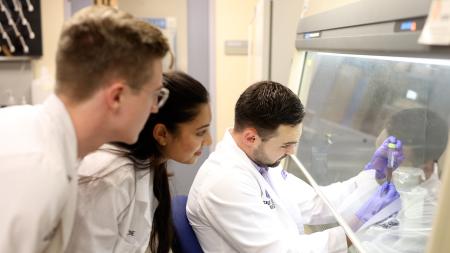
Graduation/ERAS following successful completion of program milestones
ERAS will state that student is an SIUSOM Research Scholar by virtue of completing the necessary scholarly work to earn the distinction.
The completion of the RSP will also be indicated in the Dean’s letter.
Need more information?
Yes. Your RSP mentor is a faculty member that should guide you through the RSP pathway. Ideally, you will want this person to be intimately familiar with your research project they don't need to be your research supervisor. Also, you will want to have a strong and trusting relationship with this faculty mentor to ensure that you meet the RSP pathway requirements.
If you decide to change your RSP mentor, you need to identify a new mentor, notify either Dr. Sundareshan or Dr. Braundmeier-Fleming of the new mentor and then the new mentor will be sent the RSP mentor toolkit. All Mentors must formally acknowledge and accept that they are serving as the RSP mentor.
No. You can have a research project mentor that is non-SIU faculty, but your RSP mentor must be a SIUSM faculty member.
There should be no letters of concern/warning or academic probation from the SPC for that year for the student to be eligible to participate.
Yes, you can complete the program, but you will need to identify a conference locally or regionally to present your work for review.
The student must ensure that the mentor has completed the evaluation at the end of the year.
Yes. We encourage you to stay involved irrespective of your ability to complete the RSP.
To facilitate medical students across all departments at SIU School of Medicine (SOM) to present their research efforts at external scientific and/or clinical symposia, the office of Associate Dean for Research has established an Research Scholar Fund through SIU Foundation. These funds can be used for reimbursement to help offset travel expenses incurred by the student to attend the meeting. Learn more here.
Helpful links
- Scholarly Activities Travel Reimbursement Pre-Approval Request form
- Graduate School information
- Graduate and Professional Student Council details
- Sangamon County Medical Society
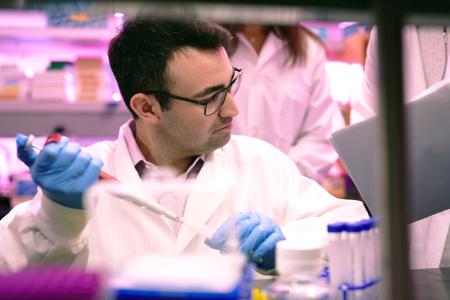
Contact information
If you are interested in this program, please notify Dr. Vidya Sundareshan, Dr. Andrea Braundmeier-Fleming, Dr. Sowmyanarayanan Thuppal, Dr. Priyanka Bhandari, Dr. Christy Hamilton or Dr. Diana Sarko.
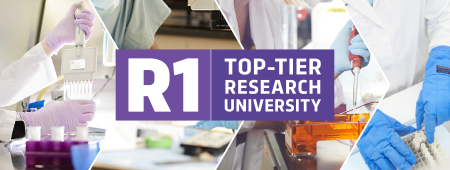
National recognition. Regional impact.
“This recognition confirms what we at SIU have always known: that world-class research is happening right here in central and southern Illinois.” – Dr. Jerry Kruse

